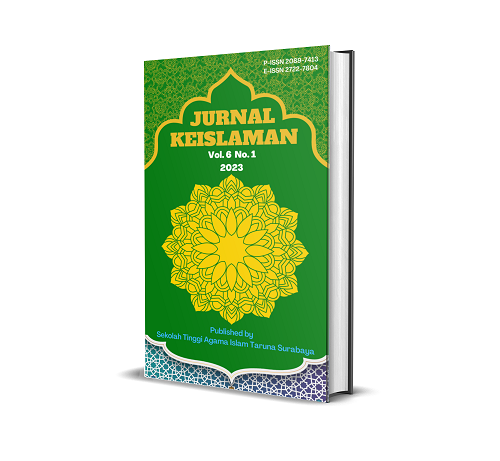Dialektika Moral Etik Penafsir Otoritarianisme: Pendekatan Hermeneutika Negosiatif Khaleed Moh. Abou El-Fadl
Abstract
Man is a religious being created by God so that it becomes commonplace when God sends agama for man. But it is not an easy matter to understand God's will through His symbols. While the Prophets and Apostles were alive, humans could directly confirm the appearance of the symbol. But when the Nth breed of abian is cut off from the present era, then it raises the potential for "polemics". Most evident is the struggle for claims as the most authoritative representative of the true God. As a result, predictably, they fighters recite fatwas, claim the truth to the point of negate different interpretations. This is what Abou Fadl is concerned about, where individuals or institutions (special representatives) have actually deprived God of authority and exceeded the authority of the real mandate. At the same time, this attitude of authoritarianism causes the stagnation of epistemology in the process of exploration of the determination of the meaning of the text. On the same occasion Abou Fadl offers a Hermeneutic approach oriented towards an authority of text interpretation by negotiating the text, author, and reader.References
Abdullah, Amin, Pendekatan Hermeneutik Dalam Studi Fatwa-Fatwa Keagamaan, Pengantar Pada Buku Atas Nama Tuhan: Dari Fiqh Otoriter Ke Fiqh Otoritatif (Jakarta: Serambi Ilmu Semesta, 2004)
Abdullah, M. Amin, Islamic Studies Di Perguruan Tinggi: Pendekatan Integratif-Interkonektif (Yogyakarta: Pustaka Pelajar, 2006)
Bleicher, Josef, Contemporery Hermeneutics (London: Routledge and Paul Keangan, 1980)
El-Fadl, Khaled M. Abou, Melawan “Tentara Tuhanâ€: Yang Berwenang Dan Sewenang-Wenang Dalam Wacana Islam (Jakarta: Serambi Ilmu Semesta, 2003)
Fadl, Khaled M. Aboe, Atas Nama Tuhan: Dari Fiqh Otoriter KeFiqh Otoritatif, Cet. 1 (Jakarta: Serambi Ilmu Semesta, 2004)
Hayani, Aida, ‘Problematic of Katoba Tradition: Study of Islamic Rituals in Muna Communities, Millati’, Journal of Islamic Studies and Humanities, 5 (2020), 87–97 <https://doi.org/10.18326/mlt.v5i1.81-97>
Izza, Lathifatul, ‘The Map of The Religious Elite Conflict and Resolution Effort’, Dialogia Jurnal Studi Islam Dan Sosial, 19 (2021), 236-268. <https://doi.org/10.21154/dialogia.v19i1.2761>
Kholik, Nur, Arketipe Pendekatan Studi Islam Formal Dan Material (Sumatera Barat: MITRA CENDIKIA MEDIA, 2021)
———, Geliat Reformasi Agama Menyingkap Argumen Epistemologi Abdolkarim Soroush (Yogyakarta: Jejak Pustaka, 2023)
Martin, Richard C., Approaches to Islam in Religious Studies (Tucson Ariz: University of Arizona Press, 1985)
Mustakim, Ahmadi dan Muh., ‘Penguatan Religiusitas Masyarakat Purwoasri, Pacitan, Jawa Timur Di Masa Pandemi’, Jurnal Pengabdian Kepada Masyarakat, 02 (2021), 96–104
Muzayyin, ‘Hermeneutika Hukum Islam Khaleed Abou El Fadl: Sebuah Tawaran Dalam Membendung Otoritarianisme Fatwa MUI’, Jurnal Potret Pemikiran, 20 (2016) <https://journal.iain-manado.ac.id/index.php/PP/article/view/749>
Nasrullah, ‘Hermeneutika Otoritatif Khaled M. Abou El-Fadl: Metode Kritik Atas Penafsiran Otoritarianisme Dalam Pemikiran Islam’, Jurnal Hunafa, 05 (2008), 139 <https://jurnalhunafa.org/index.php/hunafa/article/view/160>
Neuwirth, Angelika, Scripture, Poetry, and the Making of a Community: Reading the Qurʼan as a Literary Text, Qur’anic Studies Series (Oxford: Oxford University Press, in association with the Institute of Ismaili Studies, 2014)
Nurhakim, Imam, ‘Pertautan Antara Reader, Tet, Dan Author Dalam Memahami Nash (Studi Hermeneutika Khaled M. Abou El-Fadl Dalam Buku Speaking in God’s Name: Islamic Law, Authority an Woman)’, Jurnal Maghza, 02 (2017) <https://ejournal.uinsaizu.ac.id/index.php/maghza/article/view/1565>
Riyanto, Waryani Fajar, Integrasi-Interkoneksi: Biografi Intelektual M. Amin Abdullah (1953) Person, Knowladge and Institution (Jogyakarta: SUKA-Press, 2013)
Sardar, Zainuddin, Reading The Quran The Contemporery of The Secred Text of Islam (Oxford: Oxford University Press, 2011)
Setiawan, Asep, ‘Hermeneutika Al-Quran “Mazhab Yogya†(Telaah Atas Teori Ma’na-CumMaghza Dalam Penafsiran Al-Quran)’, Jurnal Studi Ilmi-Ilmu Al-Quran-Hadist, 16 (2017), 614 <http://dx.doi.org/10.21111/klm.v14i2. >
Wijaya, Aksin, Arah Baru Studi Ulum Al-Qur’an; Memburu Pesan Tuhan Di Balik Fenomena Budaya (Jogyakarta: Pustaka Pelajar, 2009)
Zaid, Nashr Hamid Abu, Al-Herminitiqa Wa Mu’dilatu Tafsir an-Nashsh†Dalam Bukunya, Isykaliyyat Isykaliyyat Al-Qira’at Wa ‘Aliyat at-Ta’Wil, (Beirut: al-Markaz ats-Tsaqafi al-‘Arabi, 1996)
Copyright (c) 2023 Nur Kholik, Ahmad Salim, Aida Hayani, Ahmad Yunadi, Muhammad Wafa'

This work is licensed under a Creative Commons Attribution-ShareAlike 4.0 International License.
Authors who publish with this journal agree to the following terms:
- Authors retain copyright and grant the journal right of first publication with the work simultaneously licensed under a Creative Commons Attribution-ShareAlike that allows others to share the work with an acknowledgement of the work's authorship and initial publication in this journal.
- Authors are able to enter into separate, additional contractual arrangements for the non-exclusive distribution of the journal's published version of the work (e.g., post it to an institutional repository or publish it in a book), with an acknowledgement of its initial publication in this journal.
- Authors are permitted and encouraged to post their work online (e.g., in institutional repositories or on their website) prior to and during the submission process, as it can lead to productive exchanges, as well as earlier and greater citation of published work (See The Effect of Open Access).






















